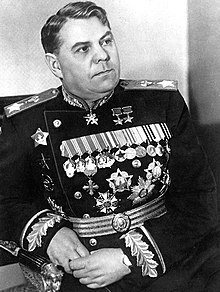
Back Aleksandr Wasiljefski AF ألكسندر فاسيليفسكي Arabic الكسندر فاسيليفسكى ARZ Aleksandr Vasilevski AZ Василевский Александр Михайлович BA Аляксандр Міхайлавіч Васілеўскі BE Александър Василевски Bulgarian Aleksandr Vassilevski Catalan Alexandr Vasilevskij Czech Василевский Александр Михайлович CV
Aleksandr Vasilevsky | |
|---|---|
Александр Василевский | |
 Vasilevsky in 1944 | |
| Minister of War | |
| In office 25 February 1950 – 15 March 1953 | |
| Premier | Joseph Stalin (1950–1953) Georgy Malenkov (1953) |
| Preceded by | Position established |
| Succeeded by | Position abolished (Post re-established as Ministry of Defence, with Nikolai Bulganin succeeding) |
| Minister of the Armed Forces | |
| In office 24 March 1949 – 25 February 1950 | |
| Premier | Joseph Stalin |
| Preceded by | Nikolai Bulganin |
| Succeeded by | Position abolished |
| Personal details | |
| Born | 30 September 1895 Novaya Golchikha, Vichuga, Russian Empire |
| Died | 5 December 1977 (aged 82) Moscow, Russian SFSR, Soviet Union |
| Resting place | Kremlin Wall Necropolis, Moscow |
| Awards | Hero of the Soviet Union (2) Order of Victory (2) Order of Suvorov, 1st Class Order of Lenin (8) Order of the Red Banner (2) Virtuti Militari |
| Military service | |
| Allegiance | (1915–1917) (1917–1922) (1922–1959) |
| Years of service | 1915–1959 |
| Rank | Marshal of the Soviet Union |
| Commands | Chief of the General Staff 3rd Belorussian Front Far East Command |
| Battles/wars | |
Aleksandr Mikhaylovich Vasilevsky (Russian: Александр Михайлович Василевский) (30 September 1895 – 5 December 1977) was a Soviet career-officer in the Red Army who attained the rank of Marshal of the Soviet Union in 1943. He served as the Chief of the General Staff of the Soviet Armed Forces (1942–1945) and Deputy Minister of Defense during World War II, and as Minister of Defense from 1949 to 1953. As the Chief of the General Staff from 1942 to 1945, Vasilevsky became involved in planning and coordinating almost all the decisive Soviet offensives in World War II, from the Operation Uranus of November 1942 to the assaults on East Prussia (January–April 1945), Königsberg (January–April 1945) and Manchuria (August 1945).
Vasilevsky began his military career during World War I, earning the rank of captain by 1917. After the October Revolution of 1917 and the start of the Civil War of 1917–1922 he was conscripted into the Red Army, taking part in the Polish-Soviet War of 1919–1921. In peacetime he quickly rose through the ranks, becoming a regimental commander by 1930. In this position he showed great skill in organizing and training his troops. Vasilevsky's talent was noticed, and in 1931 he was appointed a member of the Directorate of Military Training. In 1937, following Stalin's Great Purge, he was promoted to become a General Staff officer.
At the start of the 1943 Soviet counteroffensive of World War II, Vasilevsky coordinated and executed the Red Army's offensives on the upper Don, in the Donbas, Crimea, Belarus and the Baltic states, ending his war in Europe with the capture of Königsberg in April 1945. In July 1945 he was appointed Commander-in-Chief of Soviet forces in the Far East. He executed the Manchurian Strategic Offensive Operation (August 1945). After the war he became the Soviet Defense Minister from 1949 to 1953, a position he held until after Stalin's death in 1953. With Nikita Khrushchev's rise to pre-eminence in the mid-1950s, Vasilevsky began losing power and was eventually pensioned off. After his death he was buried in the Kremlin Wall necropolis in recognition of his past service and contributions to his country.